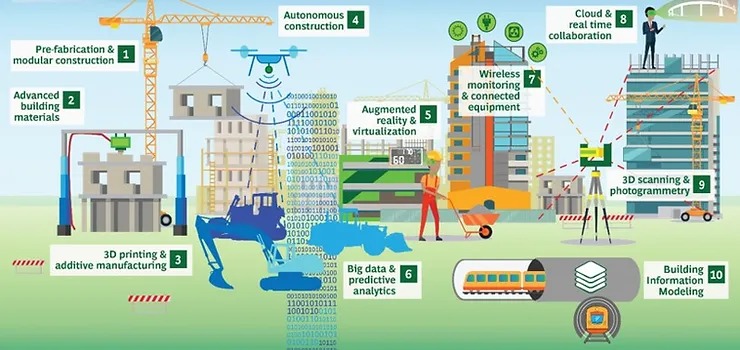Infrastructure digitalization promises a ground-breaking collaboration across project lifetimes – from design and construction through operations, maintenance, and decommissioning.
Infrastructure digitalization produces unprecedented data paving ways to transform design, construct, maintain, and transform businesses and infrastructures. Infrastructure digitalization and data are increasingly shaping how infrastructure and environment are designed and built. Drones, automation, robotics, artificial intelligence with computer vision, and IoT transform the built environment.
The Promise of Digitalization
Digitalization promises ground-breaking collaboration across the lifetime of a project, from design and construction through operations, maintenance, and decommissioning. Digitalization is helping the infrastructure ecosystem complete significant projects on time and within budget. With a sample below, organizations worldwide are already integrating digital technologies in transforming the design and construction, operation, and maintenance of the built environment and improving the quality of urban life.
“Utility companies can better forecast peak load needs when data analytics is applied to manage their grids, resulting in better management of electricity generation.”
IFC and Globaltronics
Smart meters collect and transmit real-time usage data. To expand the installation of digital prepaid and smart electricity meters in Egyptian households, the International Finance Corporation (IFC) invested $10 million in the local Egyptian company, Globetronics. The investment will support government energy reforms to improve accuracy in billing, give consumers more payment options and provide consumers with better information about their energy use to encourage savings. (IFC, 2020)
Utility Businesses
Utility companies can better forecast peak load needs when data analytics is applied to manage their grids, resulting in better management of electricity generation. Remote sensors can monitor equipment performance, resulting in better safety performance and more efficient deployment of resources for maintenance. New parts and equipment can also be made more reliable thanks to machine learning, which has applications for predictive maintenance and a longer asset lifetime. Insights from data allow utility companies to operate electric networks more efficiently, reduce operating costs, and improve user demand. (Carlo Maria Rossotto, 2021)The savings on new electricity infrastructure fitted with modern sensors and analytics have been estimated at $270 billion.
“The savings on new electricity infrastructure fitted with modern sensors and analytics have been estimated at $270 billion.”
Data Collection and Reporting
The Smart Cities market has increased since the Covid-19 pandemic, and it is projected to grow to over $650 billion by 2028. Growth in the smart cities sector is powered by increased government policies favouring economic development, ageing infrastructure, climate change, urbanization planning and an increasing need for resource management and risk mitigation. IRIS R&D Group in Canada, smart cities hardware and data platform company, provides solutions that help cities make data-driven decisions, whether it is building better roads, finding preventive maintenance opportunities, or creating asset inventories.
Winner of InfraChallenge
IRIS’, irisGO, the winner of the 2021 Global Infrastructure Hub InfraChallenge offers seamless data collection delivered by turning city buses, garbage trucks, employee vehicles and other mobile & static assets into smart autonomous and robust data collection systems. The critical element of irisGO is the ability to collect data automatically then transmit the captured data to administrators utilizing the cloud reporting platform. Data flow includes integration with existing customer data platforms. Each day data is visualized with the location and state of the art mapping to identify specific data points. (Global Infrastructure Hub, 2021)
“This technological progress – digitalization of infrastructure, services and industries will lead to tangible benefits worldwide.”
Conclusion
Emerging technologies such as 5G, smart cities and the IoT are already delivering significant benefits to communities, businesses, and local economies. This technological progress – digitalization of infrastructure, services and industries will bring tangible benefits worldwide. (Carlo Maria Rossotto, 2021)Infrastructure digitalization has also added a new dimension to infrastructure financing and liquidity models that have created new opportunities for asset managers and infrafintech entrepreneurs that would otherwise not have existed.




